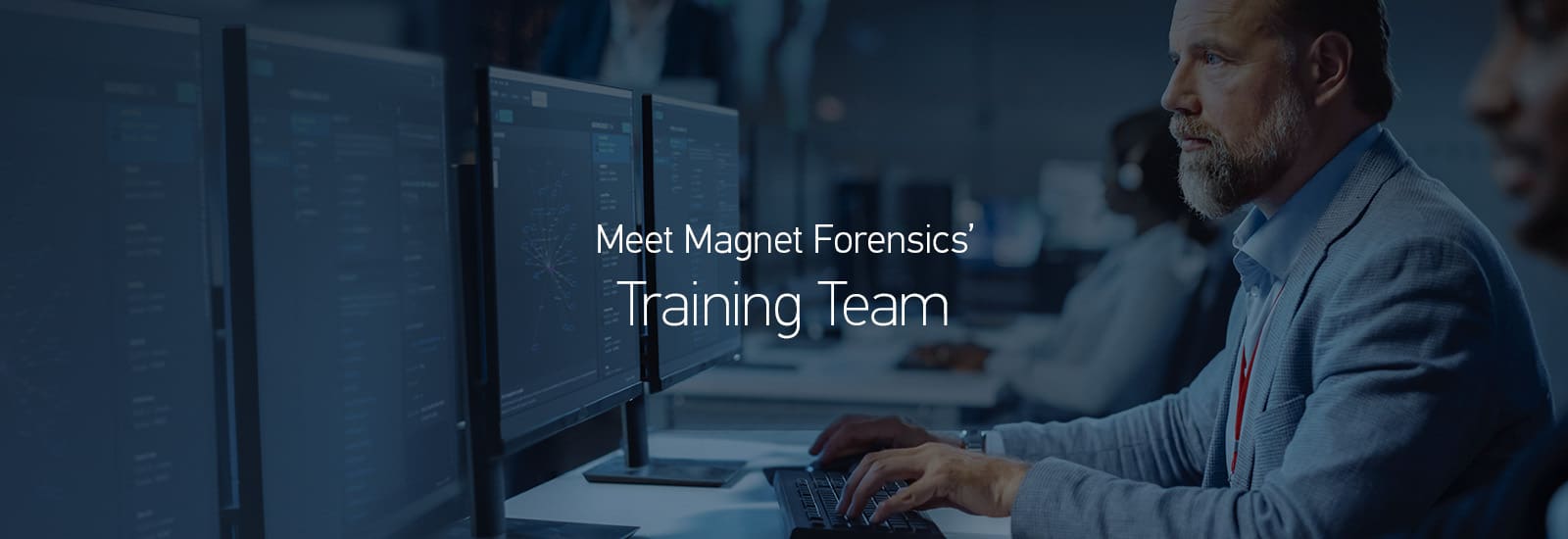
Meet Magnet Forensics’ Training Team: Preston McNair

Want to learn more about what courses are offered? Visit our Training & Certification page for more information.
MF: Tell us about your life before becoming a Trainer.
PM: Prior to Magnet Forensics, I come from West Virginia State Government, where I established a digital forensics laboratory focusing on narcotics and violent crime-related cases serving local, state, and federal government entities. I also have an extensive background in open-source intelligence (OSINT), along with audio and video forensics.
MF: What made you want to be a Trainer?
PM: I always felt the Trainer position would be an ideal combination of my technical expertise and my drive to help others. In my previous position, I spent an extensive amount of time guiding and assisting agencies with the seizure of evidence all the way to examination of the data. Being able to take highly technical concepts and effectively teach others was a critical role in the laboratory and has carried over to the perfect role here at Magnet Forensics.
MF: What type of training have you taken part in personally? What is your favorite part of the role?
PM: I received a variety of training, such as a handful of Magnet Forensics courses and other providers of digital forensics training.
MF: What excites you the most about a new class?
PM: Despite students coming from different agencies with ranging levels of experience, we have a unified mission to find and present the facts. It’s truly something memorable when this occurs in a class setting. I’m always looking forward to hearing stories from other labs, including the challenging roadblocks that others encounter, and how many different possible solutions we hear from other students.
MF: Do you ever learn anything from the students?
PM: I am always learning from those attending our classes. I believe in a “one team” mindset when it comes to digital forensics and incident response (DFIR) and we all must learn from each other to help push our community and industry forward. Learning from students also helps us improve our product and courses and helps tailor the classroom experience to reflect what they will experience back at their own labs once they depart one of our classrooms.
MF: Is there a particular moment that stands out the most to you in your career in the classroom?
PM: The moments that stand out with every class are the side discussions taking place before class, during breaks, and into the evening hours. It’s reassuring seeing this, knowing we are facilitating a welcoming environment for students to learn how they can further their capabilities and explore solutions with their cases.
MF: What do students get out of training in person that they can’t get on their own?
PM: Attending training, whether in-person or virtual, will expose you to a diverse melting pot of individuals with different ranges of experiences, case types, and advice. It also allows us as instructors to better tailor the course material and demonstrations to what you may see back in your lab. I’ve never witnessed a class where students aren’t interacting and discussing other topics, such as laboratory best practices and procedures. This is consistent to when I was a student in a Magnet classroom; it’s more than training, it’s an experience.
MF: How prepared do you feel students are to use Magnet Forensics products after taking the training course?
PM: I feel as if every student who attends our training walks away with a deeper understanding of the power of AXIOM and how it can be utilized in their work. Even the most experienced in a classroom will share something they learned that day. Students should feel well-prepared leaving the classroom to implement what they learned.
MF: What is most unique about Magnet Forensics’ approach to training?
PM: Magnet is consistently updating course material to keep things fresh, while also applying a case scenario to each training. This helps immerse the students in how AXIOM and its incredible features can be applied once the training week is over. Instructors also take time to learn about the attendees and what cases are commonly being worked on amongst the students, which further tailors the experience.
MF: Why do you think certification is important to examiners?
PM: Certification is critical to one’s journey in the DFIR industry as you are seen as a credible source of information to multiple parties, such as supervisors, colleagues, and those involved in the justice system. It proves your competency in a tool and the science of digital forensics.
MF: How do you manage to keep up on the latest trends in digital forensics?
PM: Continuous learning is a necessity for this industry. Outside of following technology manufacturers and their latest moves, I indulge in DFIR research frequently and contribute to those efforts whenever possible. Noticing a theme? We must continue learning from each other to keep pushing forward.
MF: What trends do you see coming down the pipeline in digital forensics?
PM: I personally can see a day where charging ports on devices will become a thing of the past. With the rise of wireless charging, wireless accessories, and the rapidly declining need for a consumer to ever connect a device to a computer, I think the possibility of this occurring will have a significant impact on our industry in the years to come.
Thank you, Preston! Welcome to the Training team and to Magnet Forensics – we look forward to seeing your future contributions
Click here to go to the Magnet Forensics Training and Certification Portal.